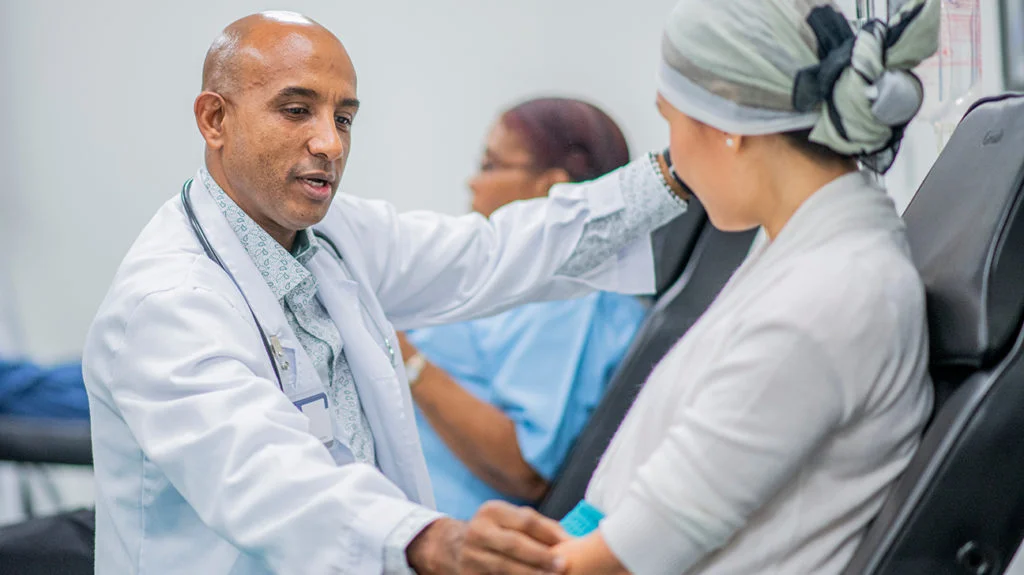- Emergency Line:(+91) 9555943636
- Mon - Fri: 9:00 am - 5:00 pm (24x7 Emergency)
- 8 Marla, Model Town, Sonipat, Haryana 131001
Primax Oncology Center: Comprehensive Cancer Treatment & Care in Sonipat


Welcome to the Primax Oncology Center at Primax Gastro Institute & Superspeciality Hospital in Sonipat, where hope meets healing in comprehensive cancer treatment.
Our world-class oncology team combines cutting-edge cancer therapies with compassionate patient care to deliver exceptional outcomes for various cancer types. As the premier cancer hospital in Sonipat, we specialize in advanced diagnostic techniques, personalized treatment protocols, and supportive care that addresses every aspect of your cancer journey.
At Primax Oncology Center, we understand that a cancer diagnosis can be overwhelming. That’s why our multidisciplinary team of best cancer specialists in Sonipat works collaboratively to create individualized treatment plans that maximize effectiveness while prioritizing your quality of life.
From early detection to advanced cancer surgery in Sonipat, chemotherapy, radiation therapy in Sonipat, and immunotherapy treatment in India, we offer comprehensive oncology services under one roof.
Our commitment to minimally invasive techniques, targeted therapies, and holistic care ensures better outcomes, faster recovery, and renewed hope for our patients and their families.
✅ Comprehensive Cancer Treatment Excellence
✅ State-of-the-Art Oncology Infrastructure
✅ Cutting-Edge Cancer Treatment Modalities
✅ Patient-Centric Cancer Care Approach
Lung Cancer – Advanced Treatment Solutions at Primax Oncology Center
Lung cancer requires immediate expert attention and comprehensive treatment. Our oncology specialists in Sonipat provide cutting-edge therapies that offer hope and improved survival rates.
Understanding Lung Cancer: Causes, Symptoms, and Risk Factors
What Causes Lung Cancer? Lung cancer develops when abnormal cells grow uncontrollably in the lungs. While smoking is the leading cause, non-smokers can also develop lung cancer.
Common Risk Factors:
When to Seek Our Expert Cancer Care
Immediate Consultation Needed If You Experience:
Lung Cancer Symptom Recognition Guide
| Symptom Category | Description | Action Required |
|---|---|---|
| Early Warning Signs | Persistent dry cough, mild chest discomfort | Schedule consultation |
| Progressive Symptoms | Cough with blood, shortness of breath, weight loss | Urgent evaluation within 48 hours |
| Advanced Symptoms | Severe chest pain, bone pain, and neurological symptoms | Same-day emergency consultation |
| Critical Signs | Severe breathing difficulty, massive hemoptysis | IMMEDIATE EMERGENCY |
Our Advanced Treatment Approach for Lung Cancer
A. Precise Diagnosis:
B. Comprehensive Treatment Options:
C. Advanced Procedures for Complex Cases:
Why Choose Primax Oncology Center for Lung Cancer Treatment?
💪 Take the Next Step Toward Recovery
If you experience persistent respiratory symptoms or have been diagnosed with lung cancer, don’t lose hope. Advanced treatments can significantly improve outcomes.
Consult our oncology specialists at Primax Oncology Center & Superspeciality Hospital at +91 96664 60009 or visit our contact page to schedule your consultation and begin your journey toward healing.
Breast Cancer Treatment – Comprehensive Women’s Oncology Care
Breast cancer is the most common cancer among women, but with early detection and advanced treatment, survival rates are excellent. Our breast cancer treatment specialists in Sonipat offer hope, dignity, and cutting-edge therapies.
Understanding Breast Cancer: Causes, Symptoms, and Types
What Causes Breast Cancer? Breast cancer occurs when breast cells develop abnormal growth patterns. While exact causes vary, hormonal factors, genetic mutations (BRCA1/BRCA2), and lifestyle factors all play roles. At Primax, we emphasize that breast cancer is treatable, especially when detected early.
Common Risk Factors:
When to Seek Our Expert Breast Cancer Care
Immediate Consultation Needed If You Notice:
Breast Cancer Detection and Staging Guide
| Stage Category | Description | Treatment Approach |
|---|---|---|
| Stage 0 (DCIS) | Non-invasive, confined to milk ducts | Surgery + possible radiation |
| Stage I-II | Early breast cancer, localized to breast | Surgery + chemotherapy/radiation |
| Stage III | Locally advanced, lymph node involvement | Neoadjuvant therapy + surgery |
| Stage IV | Metastatic breast cancer | Systemic therapy + targeted treatment |
Our Advanced Breast Cancer Treatment Approach
A. Comprehensive Diagnosis:
B. Personalized Treatment Protocols:
C. Advanced Targeted Therapies:
Prevention and Early Detection
Why Choose Primax Oncology Center for Breast Cancer Treatment?
💪 Take Control of Your Breast Health Today
Early detection saves lives. If you’ve noticed breast changes or are due for screening, act now.
Contact Primax Oncology Center at +91 96664 60009 or book your appointment online to schedule a consultation with our breast cancer specialists. Hope and healing await.
Colorectal Cancer – Expert Gastrointestinal Oncology Services
Colorectal cancer is highly treatable when detected early. Our gastrointestinal oncology specialists combine advanced surgical techniques with systemic therapies for optimal outcomes.
Understanding Colorectal Cancer: Causes, Symptoms, and Prevention
What Causes Colorectal Cancer? Colorectal cancer develops in the colon or rectum, often starting as benign polyps that transform over time. Regular screening can detect and remove polyps before they become cancerous. We emphasize prevention and early detection as the best strategies against this disease.
Common Types of Colorectal Cancer:
Common Risk Factors:
When to Seek Our Expert Colorectal Cancer Care
Immediate Consultation Needed If You Experience:
Colorectal Cancer Symptom Recognition Guide
| Symptom Category | Description | Action Required |
|---|---|---|
| Early Warning Signs | Minor changes in bowel habits, occasional blood | Schedule screening colonoscopy |
| Significant Symptoms | Persistent bleeding, abdominal pain, weight loss | Urgent consultation within 1 week |
| Advanced Symptoms | Severe pain, obstruction, significant bleeding | Same-day evaluation |
| Emergency Signs | Complete bowel obstruction, massive bleeding | IMMEDIATE EMERGENCY |
Our Advanced Treatment Approach for Colorectal Cancer
A. Comprehensive Diagnosis:
B. Multimodal Treatment Options:
C. Advanced Procedures:
Why Choose Primax Oncology Center for Colorectal Cancer Treatment?
💪 Early Detection Saves Lives
Don’t ignore bowel symptoms. Screening after age 45 (or earlier with risk factors) can prevent colorectal cancer.
Schedule your consultation at Primax Oncology Center by calling +91 96664 60009 or visit our contact page. Your digestive health matters to us.
Blood Cancers (Leukemia, Lymphoma, Myeloma) – Specialized Hematologic Oncology
Blood cancers require specialized expertise and comprehensive treatment. Our hematologic oncology team offers hope through advanced therapies including chemotherapy, targeted agents, and bone marrow transplant coordination.
Understanding Blood Cancers: Types, Causes, and Symptoms
What Are Blood Cancers? Blood cancers affect the production and function of blood cells, originating in bone marrow or lymphatic system. Major types include leukemia (blood and bone marrow), lymphoma (lymphatic system), and myeloma (plasma cells). Each requires distinct treatment approaches, which our specialists tailor to your specific diagnosis.
Common Types:
When to Seek Our Expert Blood Cancer Care
Immediate Consultation Needed If You Experience:
Blood Cancer Symptom Recognition Guide
| Cancer Type | Key Symptoms | Diagnostic Tests |
|---|---|---|
| Leukemia | Fatigue, infections, easy bleeding, bone pain | Complete blood count, bone marrow biopsy |
| Lymphoma | Swollen lymph nodes, fever, night sweats | Lymph node biopsy, PET-CT scan |
| Myeloma | Bone pain, fractures, kidney problems, anemia | Protein electrophoresis, bone marrow biopsy |
| All Blood Cancers | Constitutional symptoms: fatigue, weight loss | Comprehensive blood tests and imaging |
Our Advanced Treatment Approach for Blood Cancers
A. Precise Diagnosis:
B. Comprehensive Treatment Protocols:
C. Advanced Treatment Modalities:
Why Choose Primax Oncology Center for Blood Cancer Treatment?
💪 Blood Cancers Are Treatable – Don’t Lose Hope
Many blood cancers are highly responsive to treatment, with excellent remission rates.
Contact our hematology-oncology specialists at +91 96664 60009 or book an appointment at Primax Oncology Center. Expert care begins with your first call.
Head and Neck Cancers – Comprehensive Treatment with Functional Preservation
Head and neck cancers require specialized surgical expertise and multidisciplinary care. Our team focuses on cancer cure while preserving vital functions like speech, swallowing, and appearance.
Understanding Head and Neck Cancers: Causes, Symptoms, and Risk Factors
What Are Head and Neck Cancers? These cancers affect the oral cavity, throat, larynx (voice box), sinuses, and salivary glands. Tobacco and alcohol use are major risk factors, along with HPV infection. Early detection significantly improves treatment outcomes and quality of life.
Common Sites:
When to Seek Our Expert Head and Neck Cancer Care
Immediate Consultation Needed If You Experience:
Head and Neck Cancer Symptom Recognition Guide
| Cancer Site | Key Warning Signs | Action Required |
|---|---|---|
| Oral Cavity | Non-healing ulcer, white/red patches, loose teeth | Consultation within 2 weeks |
| Larynx | Persistent hoarseness >3 weeks, difficulty breathing | Urgent ENT evaluation |
| Pharynx | Difficulty swallowing, ear pain, neck mass | Evaluation within 1 week |
| Any Site | Rapid growth, bleeding, difficulty eating | Same-day consultation |
Our Advanced Treatment Approach for Head and Neck Cancers
A. Comprehensive Diagnosis:
B. Multimodal Treatment Options:
C. Function-Preserving Approaches:
Why Choose Primax Oncology Center for Head and Neck Cancer Treatment?
💪 Early Detection Prevents Advanced Disease
Don’t ignore persistent mouth sores, hoarseness, or neck lumps. Early treatment preserves function.
Schedule your head and neck evaluation at Primax Oncology Center: +91 96664 60009 or contact us online. Expert, compassionate care awaits.
Gastrointestinal Cancers – Advanced Treatment for Digestive System Malignancies
Gastrointestinal (GI) cancers affect the digestive tract from the esophagus to the anus. Our GI oncology specialists provide comprehensive treatment using surgery, chemotherapy, and targeted therapies.
Understanding Gastrointestinal Cancers: Types, Causes, and Symptoms
What Are Gastrointestinal Cancers? GI cancers include malignancies of the esophagus, stomach, liver, pancreas, gallbladder, small intestine, and anus (colorectal cancer covered separately). Each has unique risk factors and treatment approaches. Early symptoms are often subtle, making awareness crucial.
Common GI Cancer Types:
When to Seek Our Expert GI Cancer Care
Immediate Consultation Needed If You Experience:
Gastrointestinal Cancer Symptom Recognition Guide
| Cancer Type | Key Symptoms | Diagnostic Approach |
|---|---|---|
| Esophageal | Progressive dysphagia, weight loss, chest pain | Upper endoscopy with biopsy |
| Gastric | Early satiety, abdominal pain, and anemia | Upper endoscopy, CT imaging |
| Liver | Right upper abdominal pain, jaundice, weight loss | CT/MRI, AFP tumor marker |
| Pancreatic | Abdominal/back pain, jaundice, weight loss | CT pancreas protocol, CA 19-9 |
| Gallbladder | Right upper abdominal pain, jaundice | Ultrasound, CT/MRI |
Our Advanced Treatment Approach for Gastrointestinal Cancers
A. Comprehensive Diagnosis:
B. Multimodal Treatment Protocols:
C. Advanced Treatment Options:
Why Choose Primax Oncology Center for GI Cancer Treatment?
Don’t Ignore Digestive Symptoms that Could Be More Than Indigestion
Persistent stomach pain, jaundice, or weight loss should not be ignored. Early detection improves treatment success dramatically.
Consult our GI oncology specialists at Primax Oncology Center: +91 96664 60009 or schedule online. Compassionate, expert care for your digestive health.


Thank You for Submitting
You appointment query has been registered you will soon recieve confirmation call from Hospital if not received call@9666460009
